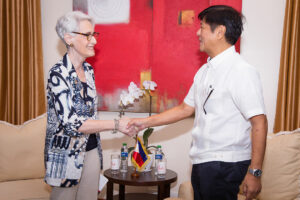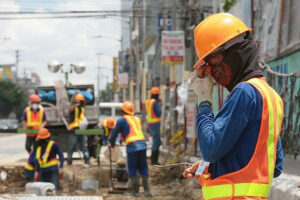Marcos, US envoy discuss free, open Indo-Pacific

PRESIDENT-ELECT Ferdinand R. Marcos, Jr. on Thursday talked about preserving a free and open Indo-Pacific during a meeting with the United States’ No. 2 diplomat, Washington said in a statement on Thursday.
He and US Deputy Secretary of State Wendy Sherman, who is visiting the Philippines and several Asian countries this month, also talked about boosting economic ties, human rights and regional security, it added.
The US State Department said Mr. Marcos and Ms. Sherman “highlighted the importance of the US-Philippine alliance to security and prosperity in the Indo-Pacific region and the world, and the importance of fostering respect for human rights and rule of law in the Philippines.”
“We discussed strengthening our longstanding alliance, expanding people-to-people ties, deepening our economic relationship, advancing human rights and preserving a free and open Indo-Pacific,” she tweeted separately.
The Philippines is the oldest security ally of the US in Southeast Asia and one of the five treaty allies of the US in the Pacific region. They have a Mutual Defense Treaty signed in 1951, under which both are constrained to support each other in case of an external attack.
Philippine President Rodrigo R. Duterte has derided the United States during much of his six-year term putting one of America’s oldest alliances in Asia on the back foot. He led a pivot toward China, with which he sought closer trade and investment ties.
The tough-talking leader had threatened to cancel a two-decade military pact with the US on the deployment of troops for war games. The visiting forces agreement makes it easier for US troops and ships to operate in the Philippines, including conducting large combat exercises that have alarmed China.
Mr. Marcos and Ms. Sherman had “agreed on the importance of partnering together to strengthen our economies, including the importance of public-private partnerships, clean energy and our digital economy,” Ned Price, State department spokesman, said in the statement.
“They discussed opportunities for our two nations to deepen our alliance and friendship and seize new opportunities to deliver for our people in the years to come,” he added.
Philippine Ambassador to the US Jose Manuel G. Romualdez, incoming Executive Secretary Victor D. Rodriguez and Foreign Affairs Undersecretary Ma. Theresa P. Lazaro also attended the meeting.
Ms. Sherman is also set to visit South Korea, Laos and Vietnam.
“The deputy secretary’s travel to the region reflects the United States’ continued commitment to the Indo-Pacific,” the US State Department said in a statement earlier.
Ms. Sherman’s Asia trip followed the US-Association of Southeast Asian Nations Special Summit in May, US President Joseph R. Biden, Jr.’s visit to South Korea and Japan, the Quad Leaders’ Summit in Tokyo, and the launch of the Indo-Pacific Economic Framework.
Leaders of Japan, Australia, the US and India — members of the so-called Quad alliance — last month said they oppose all attempts to “change the status quo by force, particularly in the Indo-Pacific.”
The statement came amid international pressure on Russia to stop its invasion of Ukraine, and a growing concern about whether China could try to seize self-ruled Taiwan.
Mr. Marcos earlier said the Philippines under his administration would join a US-backed economic framework for the Indo-Pacific that Washington crafted to counter China’s growing influence in the region.
Experts have said it remains to be seen whether Mr. Marcos would pursue closer ties with China since the US has elevated efforts to take its alliance with the Philippines to the next level.
Mr. Biden last month spoke with Mr. Marcos on the phone to congratulate him on his landslide election. He also looked forward to “working with the president-elect to continue strengthening the US-Philippine alliance,” the White House said earlier.
The US leader also wanted to expand bilateral cooperation on issues including the fight against the coronavirus, addressing the climate crisis, promoting broad-based economic growth and respect for human rights, it added.
Also on Thursday, Clarita R. Carlos, who will become Mr. Marcos’ national security adviser, said the incoming government would confront the Maoist insurgency by solving social injustice.
The government would not gain anything from labeling some people as communists, she told GMA News.
“Perhaps let’s not use labels,” she said. “We gain nothing if we keep on labeling people.
Ms. Carlos, a retired University of the Philippines professor, said the Marcos government would try to solve the decades-old insurgency by providing more social opportunities. “National security is human security. It should also be about the threats to your life as an individual.” — Norman P. Aquino and Kyle Aristophere T. Atienza




